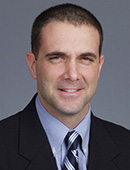Students delve into corporate crises
When corporations have crises, how they handle them can affect their reputations just as much, if not more, than the crises themselves.
In Communication Studies, graduate students in the Crisis Communication course this semester are conducting rigorous exercises that put students in the shoes of chief executive officers, managers, and other corporate leaders who are thrust into finding an effective method of handling the crisis at hand.
 “I’ve heard very positive feedback from students regarding the critical skills they’re acquiring,” said course instructor Owen Eagan, executive-in-residence and a management consultant who teaches the course. “As managerial leaders, students need to be prepared for these types of situations not only to protect their stakeholders, such as their employees, suppliers and customers, but also to protect their company’s market value.”
“I’ve heard very positive feedback from students regarding the critical skills they’re acquiring,” said course instructor Owen Eagan, executive-in-residence and a management consultant who teaches the course. “As managerial leaders, students need to be prepared for these types of situations not only to protect their stakeholders, such as their employees, suppliers and customers, but also to protect their company’s market value.”
For example, students were recently confronted with this scenario: If you are the CEO of a multi-billion dollar global corporation who was accused of knowing about a product defect that caused significant harm to consumers, what would you do?
The students began figuring out next steps for the company and developed a media relations plan. This included students using the television studios in Emerson’s Journalism Department, where they faced intense questions on camera in mock media interviews.
 “This type of training is so useful because many of us already hold leadership positions,” said Rayan Al Bakri, MA ’15, an international student from Saudi Arabia who is also a business owner. “It can take years for a company to build its reputation, but it can be destroyed overnight. That said, it’s amazing that many companies and leaders are insufficiently prepared for crises.”
“This type of training is so useful because many of us already hold leadership positions,” said Rayan Al Bakri, MA ’15, an international student from Saudi Arabia who is also a business owner. “It can take years for a company to build its reputation, but it can be destroyed overnight. That said, it’s amazing that many companies and leaders are insufficiently prepared for crises.”
 Karen Nelson, MA ’16, worked at a domestic violence shelter in Vermont before enrolling at Emerson. At that job, she saw interpersonal crises arise with clients, and now appreciates learning how to handle crises at the corporate level.
Karen Nelson, MA ’16, worked at a domestic violence shelter in Vermont before enrolling at Emerson. At that job, she saw interpersonal crises arise with clients, and now appreciates learning how to handle crises at the corporate level.
“I’ve really learned how to handle these types of things in a hands-on way,” Nelson said. “I have a lot of experience comforting victims of violence who encounter a crisis, such as running into their perpetrator in public. In this class, I’m building skills on how to handle things like natural disasters, lawsuits, or political corruption—really anything that could negatively impact the reputation of a corporation.”
“It’s rewarding to see the College play a role in shaping these leaders,” Eagan said. “This program will certainly be an asset to them.”
Categories